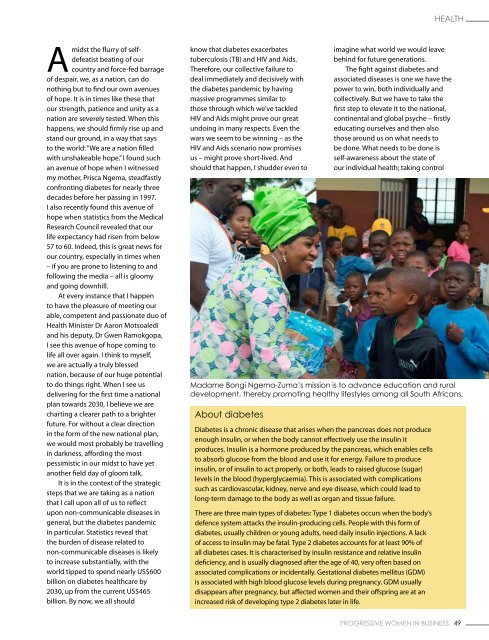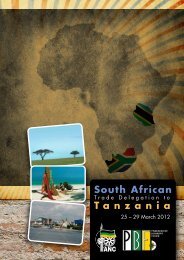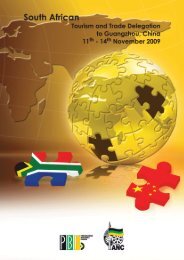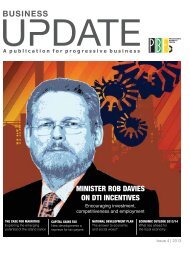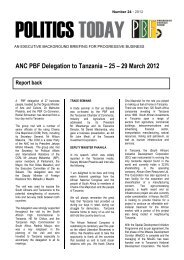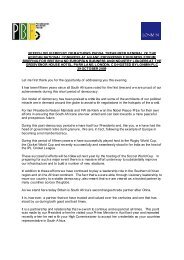SAFARI - the Progressive Business Forum website
SAFARI - the Progressive Business Forum website
SAFARI - the Progressive Business Forum website
- No tags were found...
Create successful ePaper yourself
Turn your PDF publications into a flip-book with our unique Google optimized e-Paper software.
HEALTHAmidst <strong>the</strong> flurry of selfdefeatistbeating of ourcountry and force-fed barrageof despair, we, as a nation, can donothing but to find our own avenuesof hope. It is in times like <strong>the</strong>se thatour strength, patience and unity as anation are severely tested. When thishappens, we should firmly rise up andstand our ground, in a way that saysto <strong>the</strong> world: “We are a nation filledwith unshakeable hope.” I found suchan avenue of hope when I witnessedmy mo<strong>the</strong>r, Prisca Ngema, steadfastlyconfronting diabetes for nearly threedecades before her passing in 1997.I also recently found this avenue ofhope when statistics from <strong>the</strong> MedicalResearch Council revealed that ourlife expectancy had risen from below57 to 60. Indeed, this is great news forour country, especially in times when– if you are prone to listening to andfollowing <strong>the</strong> media – all is gloomyand going downhill.At every instance that I happento have <strong>the</strong> pleasure of meeting ourable, competent and passionate duo ofHealth Minister Dr Aaron Motsoalediand his deputy, Dr Gwen Ramokgopa,I see this avenue of hope coming tolife all over again. I think to myself,we are actually a truly blessednation, because of our huge potentialto do things right. When I see usdelivering for <strong>the</strong> first time a nationalplan towards 2030, I believe we arecharting a clearer path to a brighterfuture. For without a clear directionin <strong>the</strong> form of <strong>the</strong> new national plan,we would most probably be travellingin darkness, affording <strong>the</strong> mostpessimistic in our midst to have yetano<strong>the</strong>r field day of gloom talk.It is in <strong>the</strong> context of <strong>the</strong> strategicsteps that we are taking as a nationthat I call upon all of us to reflectupon non-communicable diseases ingeneral, but <strong>the</strong> diabetes pandemicin particular. Statistics reveal that<strong>the</strong> burden of disease related tonon-communicable diseases is likelyto increase substantially, with <strong>the</strong>world tipped to spend nearly US$600billion on diabetes healthcare by2030, up from <strong>the</strong> current US$465billion. By now, we all shouldknow that diabetes exacerbatestuberculosis (TB) and HIV and Aids.Therefore, our collective failure todeal immediately and decisively with<strong>the</strong> diabetes pandemic by havingmassive programmes similar tothose through which we’ve tackledHIV and Aids might prove our greatundoing in many respects. Even <strong>the</strong>wars we seem to be winning – as <strong>the</strong>HIV and Aids scenario now promisesus – might prove short-lived. Andshould that happen, I shudder even toimagine what world we would leavebehind for future generations.The fight against diabetes andassociated diseases is one we have <strong>the</strong>power to win, both individually andcollectively. But we have to take <strong>the</strong>first step to elevate it to <strong>the</strong> national,continental and global psyche – firstlyeducating ourselves and <strong>the</strong>n alsothose around us on what needs tobe done. What needs to be done isself-awareness about <strong>the</strong> state ofour individual health; taking controlMadame Bongi Ngema-Zuma’s mission is to advance education and ruraldevelopment, <strong>the</strong>reby promoting healthy lifestyles among all South Africans.About diabetesDiabetes is a chronic disease that arises when <strong>the</strong> pancreas does not produceenough insulin, or when <strong>the</strong> body cannot effectively use <strong>the</strong> insulin itproduces. Insulin is a hormone produced by <strong>the</strong> pancreas, which enables cellsto absorb glucose from <strong>the</strong> blood and use it for energy. Failure to produceinsulin, or of insulin to act properly, or both, leads to raised glucose (sugar)levels in <strong>the</strong> blood (hyperglycaemia). This is associated with complicationssuch as cardiovascular, kidney, nerve and eye disease, which could lead tolong-term damage to <strong>the</strong> body as well as organ and tissue failure.There are three main types of diabetes: Type 1 diabetes occurs when <strong>the</strong> body’sdefence system attacks <strong>the</strong> insulin-producing cells. People with this form ofdiabetes, usually children or young adults, need daily insulin injections. A lackof access to insulin may be fatal. Type 2 diabetes accounts for at least 90% ofall diabetes cases. It is characterised by insulin resistance and relative insulindeficiency, and is usually diagnosed after <strong>the</strong> age of 40, very often based onassociated complications or incidentally. Gestational diabetes mellitus (GDM)is associated with high blood glucose levels during pregnancy. GDM usuallydisappears after pregnancy, but affected women and <strong>the</strong>ir offspring are at anincreased risk of developing type 2 diabetes later in life.<strong>Progressive</strong> women in business 49


